透析患者的肠道微生物群:综述
IF 3.3
3区 医学
Q2 MICROBIOLOGY
引用次数: 0
摘要
人类肠道微生物群是居住在胃肠道内的一个复杂的微生物群落,其中包括在健康和疾病中发挥关键作用的大量物种。慢性肾脏病(CKD)和终末期肾脏病(ESKD)所涉及的疾病过程越来越多地被认为是肠道微生物群组成和功能失调的结果。肠道微生物群失调与 ESKD 患者(尤其是接受透析的患者)的不良临床预后和全因死亡率有关。先前的研究强调了影响 CKD 和 ESKD 肠道微生物群失调的各种因素。这些因素包括但不限于尿毒症毒素积累、慢性炎症、免疫功能障碍、药物、饮食限制和营养状况。目前还缺乏对透析情况下肠道微生物群失调进行评估的研究。在这种情况下,了解肠道微生物群的变化对于确定其对透析特异性和这一患者群体的总体预后的影响非常重要。更重要的是,评估肠道微生物群的组成可以为潜在的治疗干预目标提供信息。确定特定的微生物特征可进一步开发个性化治疗方法,改善患者预后并减轻透析期间的并发症。通过各种治疗方法(包括饮食调整、益生菌、益生元、药物和粪便移植)优化肠道微生物群,已在多种疾病中显示出潜力。这些治疗方法在透析环境中是否有效还有待观察。我们的综述旨在评估与透析患者肠道微生物群变化有关的证据。越来越多的证据表明,肠道微生物群与肾脏健康之间存在着复杂而重要的关系,这强调了肠道微生物平衡对改善透析患者预后的重要性。本文章由计算机程序翻译,如有差异,请以英文原文为准。
Gut Microbiota in Patients Receiving Dialysis: A Review
The human gut microbiota constitutes a complex community of microorganisms residing within the gastrointestinal tract, encompassing a vast array of species that play crucial roles in health and disease. The disease processes involved in chronic kidney disease (CKD) and end-stage kidney disease (ESKD) are now increasingly established to result in dysregulation of gut microbiota composition and function. Gut microbiota dysbiosis has been associated with poor clinical outcomes and all-cause mortality in patients with ESKD, particularly individuals receiving dialysis. Prior studies highlighted various factors that affect gut microbiota dysbiosis in CKD and ESKD. These include, but are not limited to, uraemic toxin accumulation, chronic inflammation, immune dysfunction, medications, and dietary restrictions and nutritional status. There is a lack of studies at present that focus on the evaluation of gut microbiota dysbiosis in the context of dialysis. Knowledge on gut microbiota changes in this context is important for determining their impact on dialysis-specific and overall outcomes for this patient cohort. More importantly, evaluating gut microbiota composition can provide information into potential targets for therapeutic intervention. Identification of specific microbial signatures may result in further development of personalised treatments to improve patient outcomes and mitigate complications during dialysis. Optimising gut microbiota through various therapeutic approaches, including dietary adjustments, probiotics, prebiotics, medications, and faecal transplantation, have previously demonstrated potential in multiple medical conditions. It remains to be seen whether these therapeutic approaches are effective within the dialysis setting. Our review aims to evaluate evidence relating to alterations in the gut microbiota of patients undergoing dialysis. A growing body of evidence pointing to the complex yet significant relationship which surrounds gut microbiota and kidney health emphasises the importance of gut microbial balance to improve outcomes for individuals receiving dialysis.
求助全文
通过发布文献求助,成功后即可免费获取论文全文。
去求助
来源期刊

Pathogens
Medicine-Immunology and Allergy
CiteScore
6.40
自引率
8.10%
发文量
1285
审稿时长
17.75 days
期刊介绍:
Pathogens (ISSN 2076-0817) publishes reviews, regular research papers and short notes on all aspects of pathogens and pathogen-host interactions. There is no restriction on the length of the papers. Our aim is to encourage scientists to publish their experimental and theoretical research in as much detail as possible. Full experimental and/or methodical details must be provided for research articles.
 求助内容:
求助内容: 应助结果提醒方式:
应助结果提醒方式:


